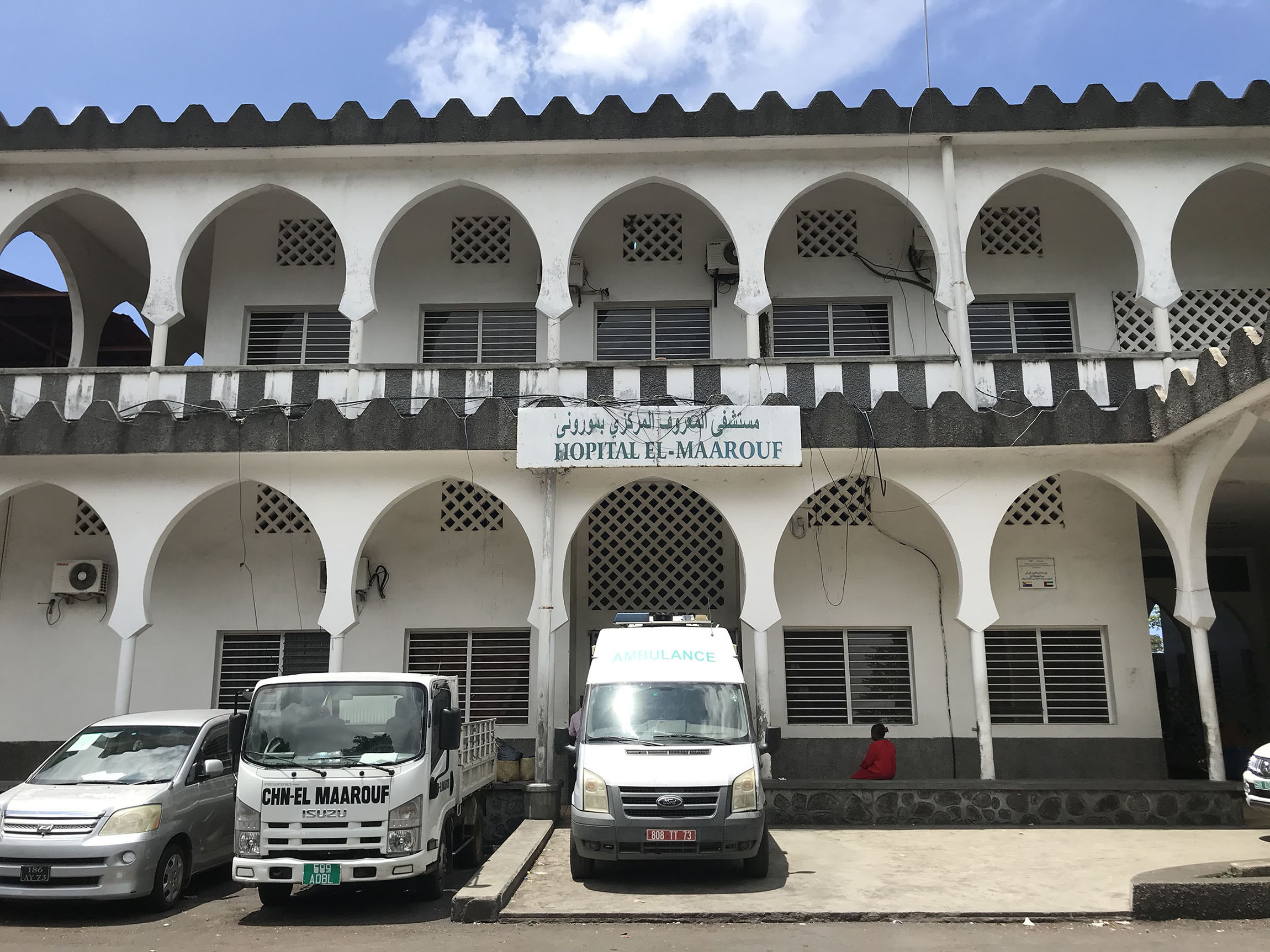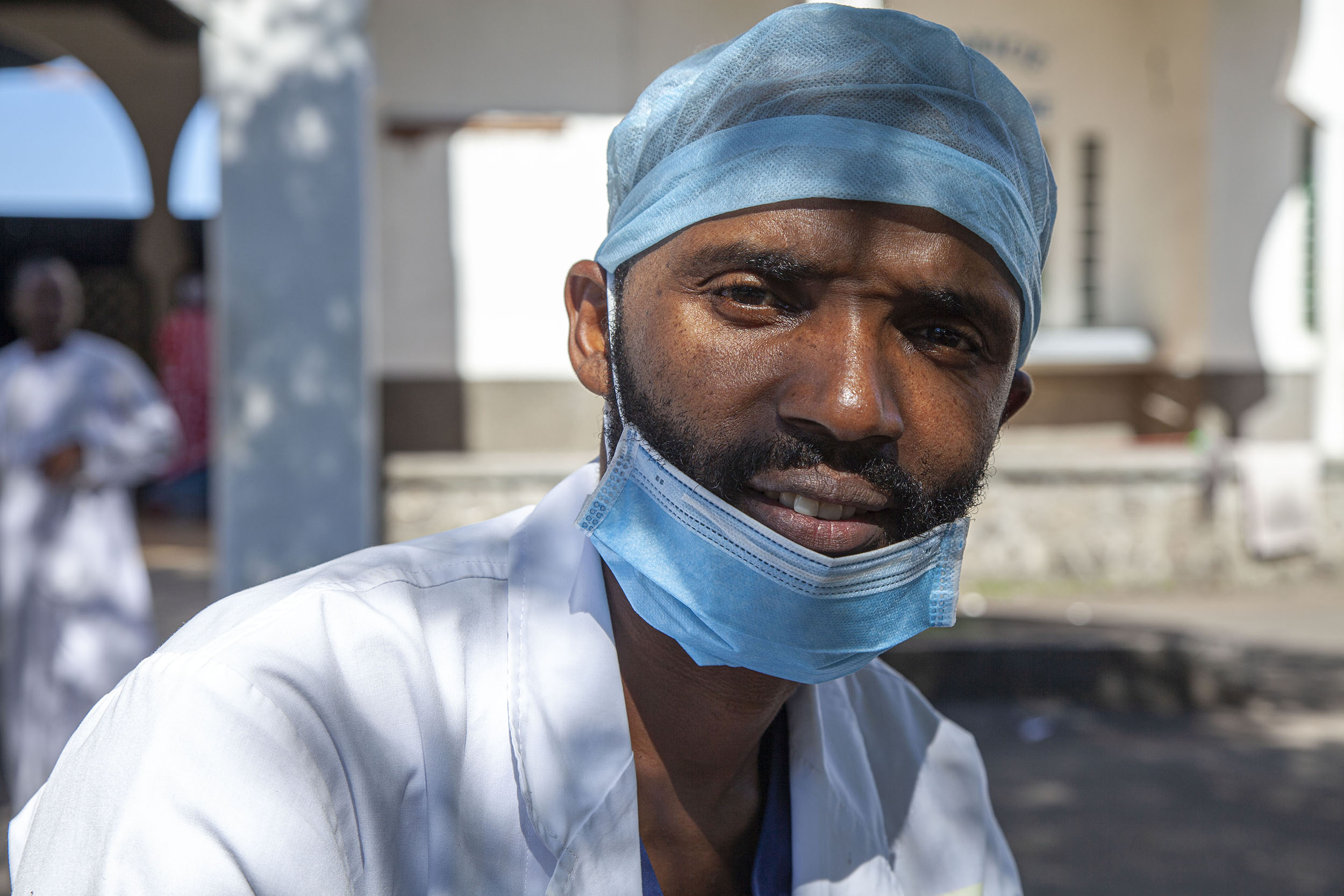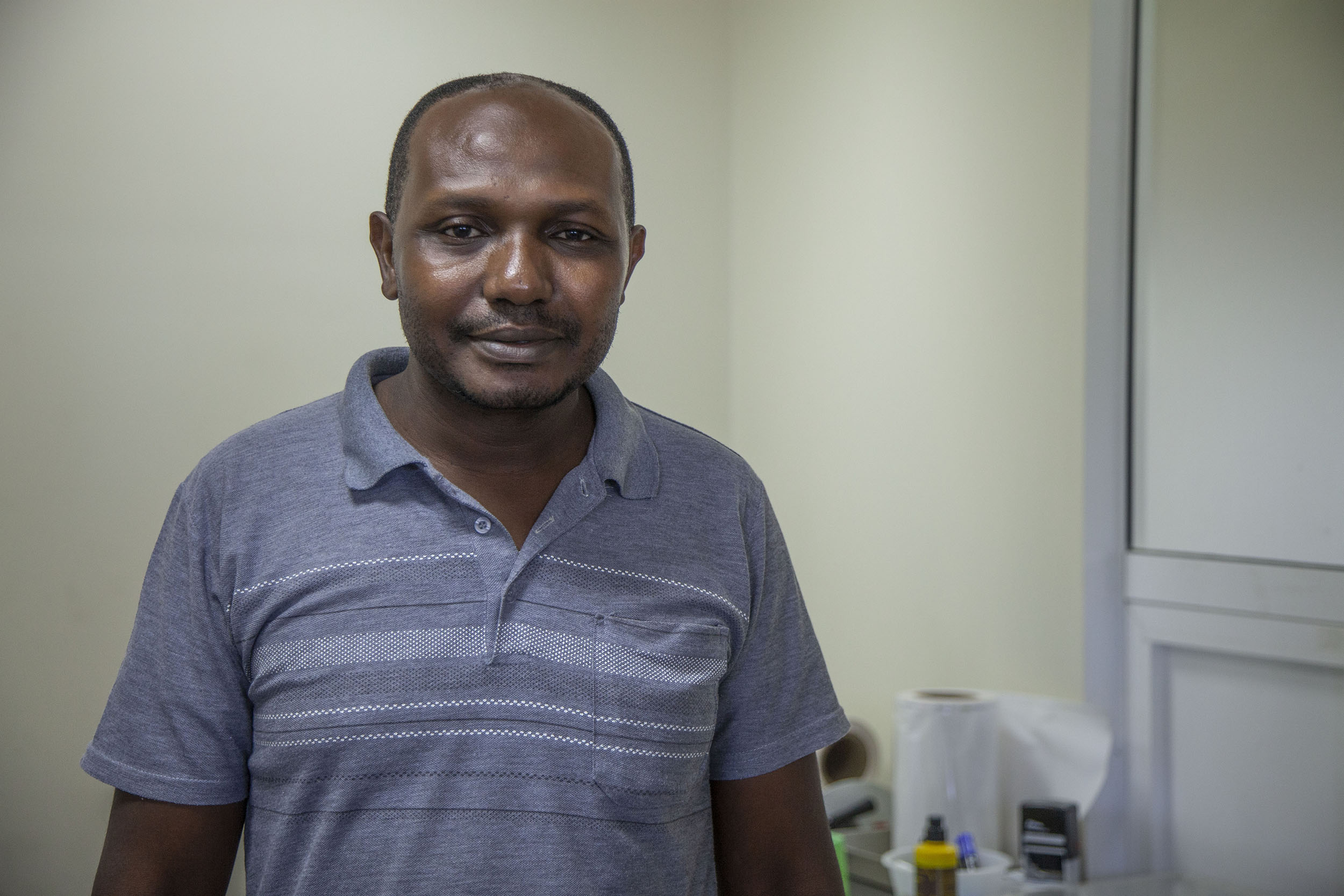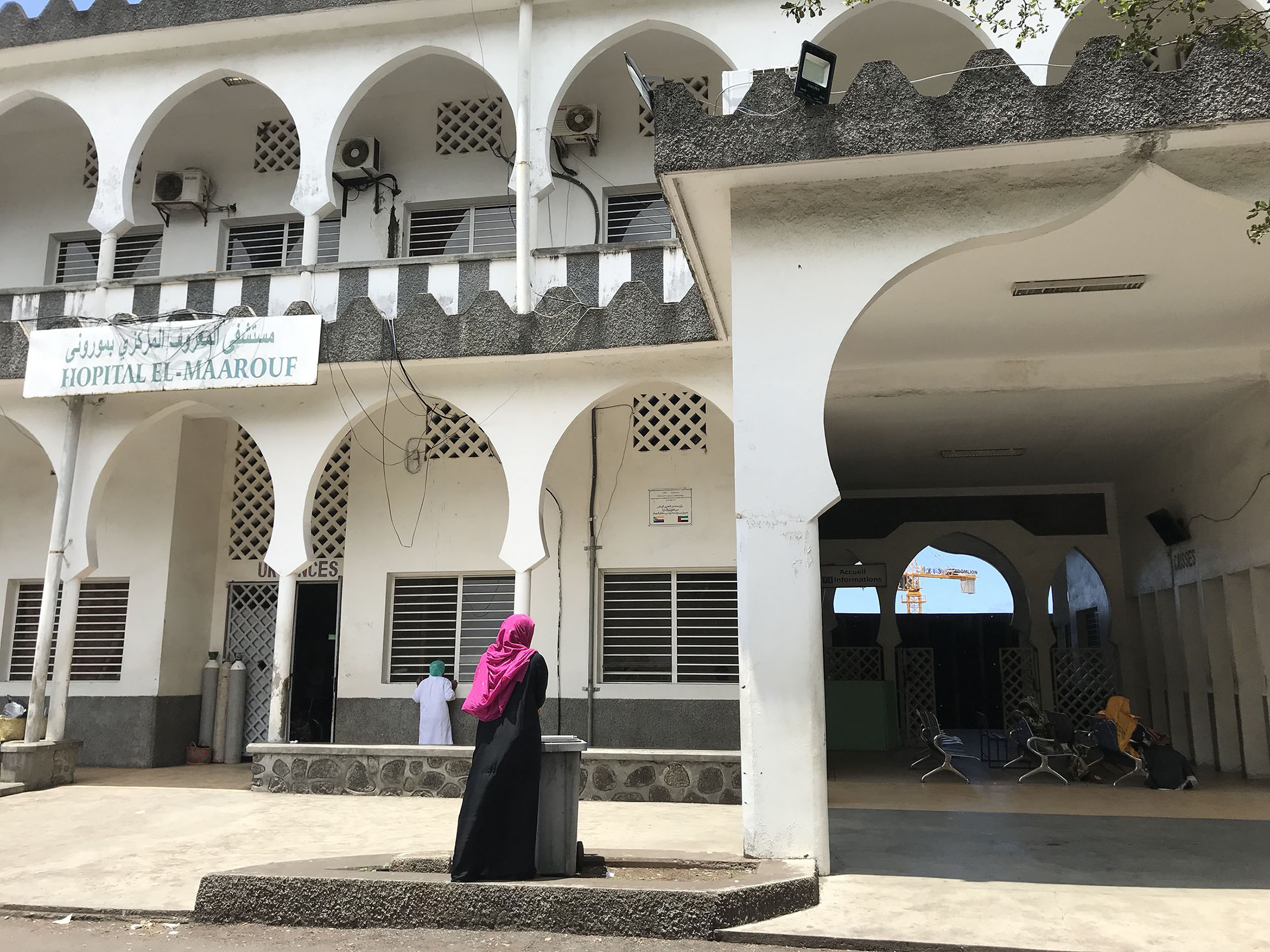It’s mid-morning and there’s a slow stream of foot traffic entering the hospital grounds. Irriguous air circulates overhead, birthing salt-laden beads that trickle over my brow. There’s not a cloud in the sky; even the trees look for shade.
Sitting before the two-story white structure with stylistic nods to the country’s Arab heritage (decorated in horseshoe arches symmetrically aligned), melodious smatterings of French and Arabic transpire as bodies - contorted and braced in a symphony of malaise, escorted arm-in-arm by scrubs and white coats - approach the entrance.

Two Comorian Male Nurses
Recording device, notebook and pen in hand, head tilted back and wearing a grin, I close my eyes momentarily and whisper “thanks” for my health. From the exterior, there’s no telling the quality of care one can expect, healthcare being a service that universally relies on sufficient fiscal support to provide the workforce with the resources it needs.
As the world’s third poorest country, it’s likely the wards are not a bounty of modern and technological health treasure.
After a period of tilting my head sideways and crinkling my eyes at the edges - modest gestural support for the sick and injured passing by, fate unknown, a man in scrubs with a white coat and PPE to boot approaches … insignia globally synonymous with health professionals. A meeting arranged by a kindred Chinese woman (employed at the hospital) whom I’d met during a beach stroll, Kadafi lowers his mask resting it under his chin, revealing a smile that paints sunshine all over his face.

“Hi. I’m Ben. Thanks for taking the time to meet me.”
With eyes connected and arms outstretched, we shake hands.
He and a colleague (through pre-arrangement) have agreed to show me the hospital and share narratives as nurses in Comoros. Before long, I’m ushered into the new wing (a theatre and clinic, designed and built by foreign engineers and workers) in which Halil is arranging his day while loading stainless steel equipment into industrial cleaners - a satisfying display of maintaining sterility.

Nursing Education and Norms
Over the course of the next hour, Halil details how nurses are educated (through three-year degrees in Comoros or abroad, mostly in Madagascar), the realities of the job in a developing African island-nation, and how his life as a nurse has taken shape.
Partway through, with both hands resting in his coat pockets, Kadafi nods then leaves the utility room, a waft of disinfectant sweeping through the door as he steps through; he returns to patient duties. Most of said duties - outside of theatre - involve assessment, medication management and any other special interventions (such as inserting catheters).
“It is families,” says Halil “who provide most physical care to the patients.”
I’ve seen this before, in Nepal. It’s not uncommon in collective communities and resource-poor health establishments for family members and volunteers to attend to basic care (such as hygiene, feeding and mobility), leaving nurses to manage critical needs.
“It’s manageable,” says Halil, as there is “one nurse to four patients.”
There’s no shortage, this much is clear. In fact, between employed nurses and volunteers (mostly ex-students who graduated and haven’t yet landed a position), it seems there’s a nurse-surplus in government hospitals - extra support is nearly always available on wards.
Nursing Salaries in Comoros
“The Government does not make enough positions for nurses in hospitals,” Kalil explains, his nostrils flaring as he exhales.
What do staff - especially volunteers - do to cope, economically?
“Many nurses have businesses on the side, or jobs in private clinics. The salary is 100 Euro per month, regardless of how many shifts or hours we work.” His arms cross.
“You cannot survive unless you have a business or family living in France or other countries, sending money home.”
Kalil runs a business buying medical supplies from Dubai, India and Tanzania, then sells products locally. It keeps him and his wife (who’s a midwife at the hospital) afloat.
Given many nurses live outside Moroni (the capital), and public transport would burn at least 50 Euros a month in their scrub pockets, survival seems a stretch. Electricity, water, rent and food bills don’t pay themselves.
“There is lots of solidarity. Families help each other, sharing food and other goods,” says Halil. His chin lifts, and his shoulders roll back. I’ve seen glimmers of this community spirit and camaraderie while travelling around the island.
I shiver, momentarily, the room the Arctic to the furnace outside.
Quality of Nursing Care
Despite adequate ratios, resources can be scarce and patients need to buy what’s needed - from nearby pharmacies - for any prescribed treatments and procedures (except in the modern extension in which we stand). Getting the care that’s needed isn’t always within reach.
However, help is provided. “Each year, ADFA [Australian Doctors for Africa] sends doctors and nurses who perform orthopaedic surgeries,” Halil notes. He recounts the story of a 20-something man whose life was transformed following leg surgery, renewing his ability to walk without disability … a Godsend when much of the work on the island is labor-intensive.
Those in need of serious support and treatment are sent to neighbouring (across a small stretch of ocean) Tanzania, or even to Kenya. The hospital employs one neurosurgeon but anything outside the scope of gynaecological, basic gastroenterological or general care, means temporary relocation.
Personal Lives
With a long workweek and either permanent day shifts (7.30am to 2.30pm) or night shifts (2.30pm to 7.30am - a comment that leaves my mouth agape), there’s little time for pleasure.
“I visit my parents’ farm on Sundays, in the north-east of the island,” he admits. It’s a long and arduous drive, the roads peppered with depressions. “I take the bus as I couldn’t afford to pay for new tyres all the time.” Our faces synchronously crinkle in laughter.
The Future of Nursing in Comoros?
Halil was fortunate to study and work abroad, in a “more prosperous country,” with higher earning potential. However, he admits having returned to “help my country and people.”
With integrity and earnest in the air, I dive into politics. “What improvements would you like to see, for nurses and healthcare, in Comoros?”
“Changes won’t happen until politicians are changed. Comoros is democratic but Africa is still Africa.” There’s a long pause. His clenched fist moves under his chin.
“The government takes care of itself, not the people.” He sighs. It’s a ubiquitous malady that infects politics and the individuals who saturate the positions of power, a general disregard for the people and their desires I’ve heard recounted many times in my travels. Who wins?
“We stick together and help each other. Plus, China, the UAE [United Arab Emirates] and Saudi Arabia provide help.”
Behind the dated, two-story white structure I saw almost an hour ago on arrival, are cranes and a building site which I learn is a multi-storey, modern hospital being constructed by the Chinese Government. It’s not all doom and gloom. There is hope.

I thank Halil for his time and for his trust in me, then return to the AirBNB room a few kilometres away that I’ve made my home.
I’m grateful to have met Kadafi and Halil, two empathic, earnest and hard-working male nurses who, despite daily facing developing-world challenges in their respective nursing roles, are generous with their time and souls. They give me hope and invoke a spirit of optimism that things can and do change, but said change often materialises in surprising and unexpected ways.
For more nursing stories from around the globe, sign up (below) to my newsletter and regularly check this page for new articles.
